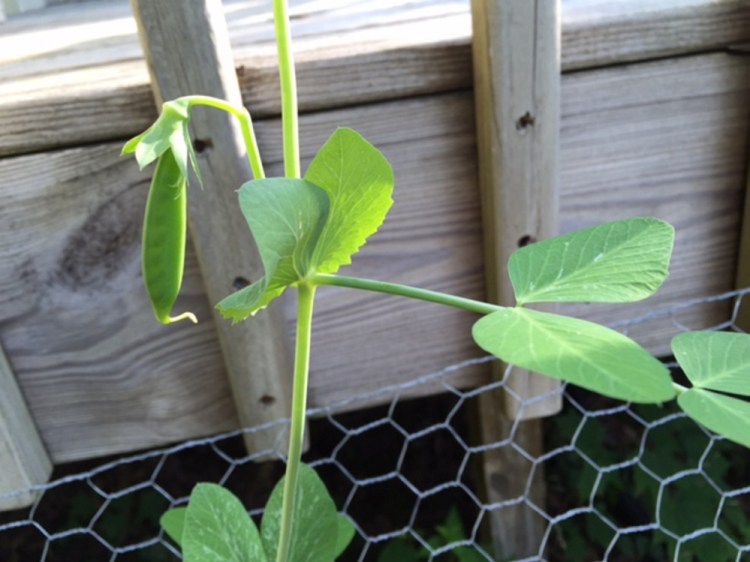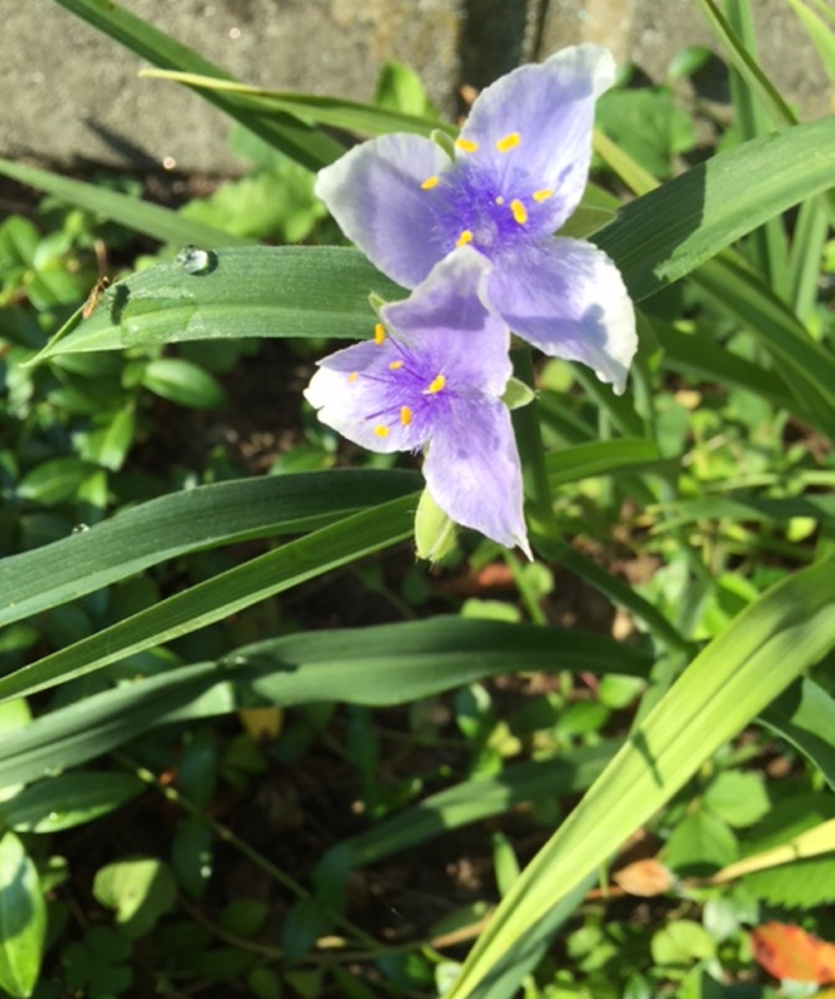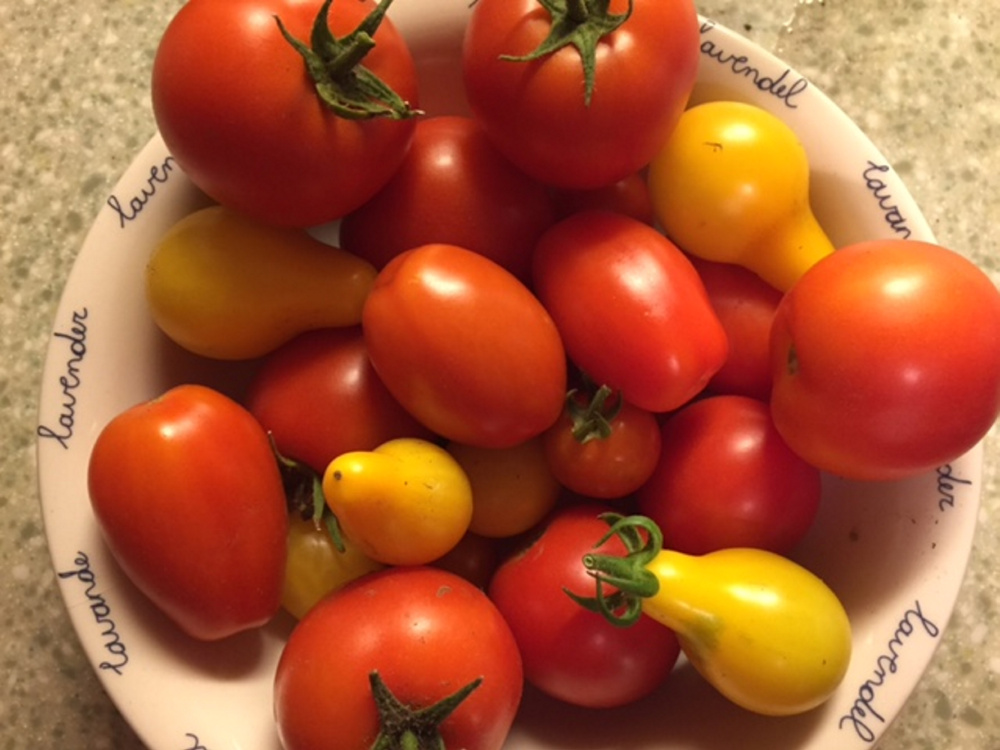Although I am not an unhappy person, contentment has been depressingly elusive in my adult life. It arrives on rare occasions, mostly when I am on vacation – a merry meal in a garden in Barcelona, a summer afternoon sitting on the dock on Lake Champlain, a clamber up the almost painfully beautiful Fox Island at Popham Beach.
At home, though, contentment usually takes a holiday.
Floors need washing, bills need paying, desks need organizing. If I am talking to person X on the phone, I am fretting that I neglected to return the call of person Y. The chores feel infinite, the time available to get them done discouragingly finite.
One early July morning this summer, however, I stepped out into my garden and contentment slipped in. It was 6 a.m. and sunny, a work day. I watered beds, I weeded here and there, I wandered about looking for a suitable home for two lemon balm plants, gifts from a generous neighbor. I paused to admire my sugar snaps, and I sized up the lawn critically. In a flash, a long hour had passed, and emotions I’d often sought (in vain) from yoga, my very modest garden had kindled: I felt present, open, unhurried, content. Back inside, I dressed for work, a little dazed.
I have been planting the garden outside my new home in fits and starts. In the spring, I started out like gangbusters (or perhaps like mint plants let loose), but as summer raced by and visitors visited and my September bicycle tour loomed, I cycled and I trooped to Fort Williams and I ate lobster rolls more – and I gardened less.
It is the first garden I’ve ever planted, outside the first home I have ever owned. I thought I was planting it for a ready supply of herbs, rhubarb and tomatoes and also because my sweet 101-year-old bungalow begged for some fetching accessories – coral bells and coneflowers, lilies and lupine, phlox and hollyhocks, peonies and poppies. But on that morning I realized my garden had better and rarer gifts in store for me.
When I have shown it to visiting friends and family this summer, I have heard the air quotes in my voice around the word “garden.” “The garden, such as it is…” I find myself saying or trailing “garden” with “a work in progress.” For now, it consists of one small and unexceptional flower bed; one raised bed with rhubarb and strawberries; two weedy, neglected raised beds; one herb bed with thriving chives, bolting dill, and basil that is on intimate terms with a slug; two pots of productive but afflicted tomatoes (Septoria Leaf Spot, if my Internet diagnosis is correct); a wee dogwood tree that nonetheless came with the breathtaking price tag of $100; and many flourishing, inherited daylilies.
That last is among the many, many, new things I learned this year – what a daylily looks like. I wondered about the plants in early spring. Are they weeds? Should I pull them? They looked too intentional so I (wisely, it turned out) watched and waited. When the lilies finally bloomed and announced themselves to my sadly ignorant self, I don’t know which I felt more – deeply embarrassed or deeply delighted.
In late spring, my sweetheart Joe – also not a gardener – helped me plant the herb garden near the kitchen. We tried the no-dig method, which I’d read about on the Internet (God bless the Internet). He kept pausing from layering newspaper, straw and soil over the lawn to pepper me with questions: Was it wide enough? Deep enough? Wet enough?
How the heck should I know?
Questions continued to pile up: Had I planted the rhubarb too deep? The peas too late? The new flower bed too near the street where salt from the town’s road crew would kill it come winter? What’s an inoculant and what, precisely, does sprinkle “generously” mean on the inoculant package?
Was that a weed? And that?
It turned out I like to weed. I like to water, too. And rake and plant. But I loathe, and lack all talent for, building stuff. Who knew how much carpentry a garden requires? My garden – such as it is – needs a trellis for the peas and fences for the raised beds. I’ve been advised (during a useful, eye-opening permaculture consultation with the Resilience Hub) to re-contour a slope before I plant blueberries, and I’d gladly bake 100 pies for anyone who’d build me a grape arbor.
To be honest, it may be that I like to weed because I didn’t do much of it. I had little idea which were plants and which weeds (see, daylilies). I’d moved into my home in October, so I didn’t know what the garden had in store for me.
All kinds of things popped up that I found beautiful, and the bees seemed to like them, too. Even the dandelions that dotted the lawn were cheerful, and their leaves fed me well in the spring. By midsummer, the weeds had put me in a philosophical mood: Who was I, quite possibly Maine’s Most Ignorant Gardener, to declare this a good plant and that a bad one? I was pleased to chance upon a quote from Luther Burbank: “A flower is an educated weed.” He should know.
Wildlife ecologist Douglas Tallamy‘s talk at Maine Audubon in June validated what I’d previously regarded as my laziness or bad habits. He suggested gardeners leave their lawns a little long and their gardens a little messy to give the animals we share the place with food and shelter. Look at your property from the perspective of the chickadee, he said. “We’ve never shared our residential neighborhoods very well. We humans are into neatness. Leave a little mess.”
I’ve got that under control.
The daylilies were not the only happy surprise. At the back of the yard I discovered – and liberated – a rhododendron being slowly strangled by invasive multiflora. There were volunteer blackberry bushes, too, and in June my lawn was blanketed with wild strawberries. Though they get no bigger than thimbles, I intended to pick them and make an jam that in my mind tasted of midsummer and meadows. Alas, I failed to communicate with Matt, a neighbor I’d hired to mow my lawn, and most were inadvertently cut down before they had the chance to fruit.
That failure to communicate had more dire consequences. One Sunday, I spent the afternoon planting newly acquired perennials. I scattered them around the yard, not in beds, definitely a rookie move, and then I forgot to tell him. When I came home from work the next day, most had been mowed down. I sobbed for two hours. What can I say? I am a recovering English major. The perennials seemed a metaphor for all things cut down before their time.
A week passed. Equilibrium was restored. Plants I can replace, I reminded myself. Nice neighbors, not so easily.
Gardens seem to nourish generosity. At the start of the season, my neighbor Wayne noticed my meadow, I mean lawn, and mowed it out of the goodness of his very big heart. My boss handed me an attractive new shovel he had no use for, and co-workers and neighbors presented me with plants unsolicited. One afternoon, I met a stranger in the parking lot of Trader Joe’s who handed me a tray with six kinds of mint from her garden. Thank you, stranger. Thank you, Freecycle. As we parted, she asked me if I could use any irises.
Late on the night before my birthday, my sister Susan helped me lug home a large pile of rocks that a woman down the block was getting rid of. Rocks are useful in the garden, I was learning, and also expensive. My neighbor Lorelle offered straw she didn’t want with this comment: “We don’t do straw. We do dirt.” Lorelle spritzed my fledgling dogwood tree with her hose on several occasions when she thought it looked droopy, and she suggested I outgun my slugs with beer, as her mother used to. Her teetotaling mother, she added, who apparently worried that the neighbors would think she’d taken to drink.
And then there is Joe, who patiently dug and planted and weeded and watered by my side all season, even though it’s not his thing (and gave me a Hori-Hori digging tool for a birthday present, to boot). Until the drought settled in, we watered largely from my rain barrel, a terrific purchase from the city of Portland that inspired me to save household water in all manner of ways. I made a habit of emptying the dehumidifier water into the barrel, also cooking water from vegetables and pasta. At one point, I tried to save water from my showers, but the soap and shampoo bubbles ruled that out. Those showers, by the way, failed to remedy my newly dirty fingernails.
I don’t think I can yet call myself a gardener, but I already have a gardener’s fingernails.
Send questions/comments to the editors.




